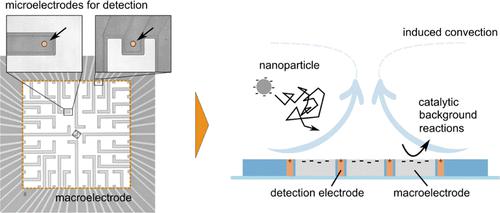当前位置:
X-MOL 学术
›
Anal. Chem.
›
论文详情
Our official English website, www.x-mol.net, welcomes your feedback! (Note: you will need to create a separate account there.)
On-Chip Electrokinetic Micropumping for Nanoparticle Impact Electrochemistry
Analytical Chemistry ( IF 7.4 ) Pub Date : 2022-07-28 , DOI: 10.1021/acs.analchem.2c02017 Lennart J K Weiß 1 , Emir Music 1 , Philipp Rinklin 1 , Marko Banzet 2 , Dirk Mayer 2 , Bernhard Wolfrum 1
Analytical Chemistry ( IF 7.4 ) Pub Date : 2022-07-28 , DOI: 10.1021/acs.analchem.2c02017 Lennart J K Weiß 1 , Emir Music 1 , Philipp Rinklin 1 , Marko Banzet 2 , Dirk Mayer 2 , Bernhard Wolfrum 1
Affiliation

|
Single-entity electrochemistry is a powerful technique to study the interactions of nanoparticles at the liquid–solid interface. In this work, we exploit Faradaic (background) processes in electrolytes of moderate ionic strength to evoke electrokinetic transport and study its influence on nanoparticle impacts. We implemented an electrode array comprising a macroscopic electrode that surrounds a set of 62 spatially distributed microelectrodes. This configuration allowed us to alter the global electrokinetic transport characteristics by adjusting the potential at the macroscopic electrode, while we concomitantly recorded silver nanoparticle impacts at the microscopic detection electrodes. By focusing on temporal changes of the impact rates, we were able to reveal alterations in the macroscopic particle transport. Our findings indicate a potential-dependent micropumping effect. The highest impact rates were obtained for strongly negative macroelectrode potentials and alkaline solutions, albeit also positive potentials lead to an increase in particle impacts. We explain this finding by reversal of the pumping direction. Variations in the electrolyte composition were shown to play a critical role as the macroelectrode processes can lead to depletion of ions, which influences both the particle oxidation and the reactions that drive the transport. Our study highlights that controlled on-chip micropumping is possible, yet its optimization is not straightforward. Nevertheless, the utilization of electro- and diffusiokinetic transport phenomena might be an appealing strategy to enhance the performance in future impact-based sensing applications.
中文翻译:

用于纳米粒子冲击电化学的片上电动微泵浦
单实体电化学是研究纳米粒子在液-固界面相互作用的强大技术。在这项工作中,我们利用中等离子强度电解质中的法拉第(背景)过程来激发电动传输并研究其对纳米粒子影响的影响。我们实现了一个电极阵列,包括一个围绕一组 62 个空间分布的微电极的宏观电极。这种配置使我们能够通过调整宏观电极的电位来改变全局电动传输特性,同时我们同时记录了银纳米粒子在微观检测电极上的影响。通过关注撞击率的时间变化,我们能够揭示宏观粒子传输的变化。我们的研究结果表明潜在的依赖微泵效应。对于强负大电极电位和碱性溶液,获得了最高的冲击率,尽管正电位也会导致粒子冲击的增加。我们通过反转泵送方向来解释这一发现。电解质组成的变化被证明起着关键作用,因为大电极过程会导致离子耗尽,这会影响粒子氧化和驱动传输的反应。我们的研究强调,受控的片上微泵浦是可能的,但其优化并不简单。然而,利用电和扩散动力学传输现象可能是提高未来基于冲击的传感应用性能的一种有吸引力的策略。
更新日期:2022-07-28
中文翻译:

用于纳米粒子冲击电化学的片上电动微泵浦
单实体电化学是研究纳米粒子在液-固界面相互作用的强大技术。在这项工作中,我们利用中等离子强度电解质中的法拉第(背景)过程来激发电动传输并研究其对纳米粒子影响的影响。我们实现了一个电极阵列,包括一个围绕一组 62 个空间分布的微电极的宏观电极。这种配置使我们能够通过调整宏观电极的电位来改变全局电动传输特性,同时我们同时记录了银纳米粒子在微观检测电极上的影响。通过关注撞击率的时间变化,我们能够揭示宏观粒子传输的变化。我们的研究结果表明潜在的依赖微泵效应。对于强负大电极电位和碱性溶液,获得了最高的冲击率,尽管正电位也会导致粒子冲击的增加。我们通过反转泵送方向来解释这一发现。电解质组成的变化被证明起着关键作用,因为大电极过程会导致离子耗尽,这会影响粒子氧化和驱动传输的反应。我们的研究强调,受控的片上微泵浦是可能的,但其优化并不简单。然而,利用电和扩散动力学传输现象可能是提高未来基于冲击的传感应用性能的一种有吸引力的策略。


























 京公网安备 11010802027423号
京公网安备 11010802027423号